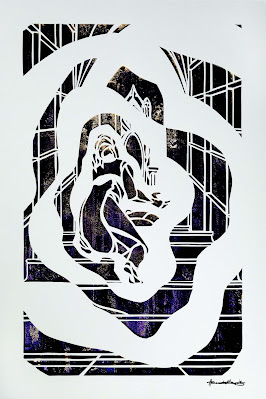read John 13:1-17, 31b-35
from the artist | Hannah Garrity
“Yes, they’ll know we are Christians by our love, by our love. Yes, they’ll know we are Christians by our love.”11
We know that the disciples and Jesus were constantly on the move, walking from one town to the next. The dust on their feet was surely ever-present. What is the meaning of the foot washing ritual? I find that it is a show of sacrificial love, a show of intimate care. In the art for this week, I visually explore the contrast between the structures of human power and the soft, sacrificial love of God.
Vertical, diagonal, and horizontal lines are found in architecture, in power grids, in city planning. Cold, glossy marble, gold leaf, cavernous ceilings with great height: these are the materials, the lines, of human power. In this image, vertical and diagonal lines place Jesus in a grand throne room. Yet the power he offers on this Maundy Thursday is not a power understood by the cold, sharp, human power exhibited in the architecture.
By leaning down and washing the feet of his disciples, Jesus introduces a curve in the layout. Jesus’ figure kneels over a bowl of water at the top of the stairs. This act of sacrificial love ripples like water through the lives of Jesus’ disciples, from that year to this one. It is organic; it is mysterious. Ripples and edges intersect, expanding outward from the figure. The collision of human and heavenly power exhibits a daily phenomenon. Which power will you choose? Whose feet will you wash?
11 Scholtes, Peter. “They’ll Know We Are Christians.” © 1966 F.E.L. Publications, assigned to the Lorenz Publishing Company, 1991.
reprinted with permission from A Sanctified Art

No comments:
Post a Comment